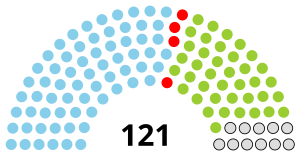South African general election, 1910
|
|
|||||||||||||
|---|---|---|---|---|---|---|---|---|---|---|---|---|---|
|
|||||||||||||
|
All 121 seats in the House of Assembly |
|||||||||||||
|
|||||||||||||

House of Assembly after the election
|
|||||||||||||
|
|||||||||||||
The 1910 South African general election was held for the 121 seats in the House of Assembly of the Union of South Africa, on 15 September 1910. This was the first general election, after the Union came into force on 31 May 1910.
In addition to the general election, the first election to the provincial councils of Cape Province and Transvaal took place on the same day. Those councils used the same electoral districts as those for the House of Assembly seats in the province. The first election for the provincial councils of Natal and Orange Free State, which did not use the same constituency boundaries as the House of Assembly, took place on a later date.
The South African National Party (known as the South African Party from 1911) of General Louis Botha won a slim majority. The Unionist Party became the official opposition.
The South Africa Act 1909 provided that the franchise in each province should be the same as that in the corresponding colony before the Union, until altered by the Union Parliament. The Act included entrenching clauses, providing that black and coloured voters could only be removed from the common voters roll in the Cape of Good Hope, by legislation passed by a two-thirds majority by both houses of Parliament in joint session.
The franchise, in all parts of the Union, was limited to men over the age of 21. There were some additional qualifications and disqualifications which varied between provinces.
The franchise in the Orange Free State and Transvaal was limited to white men.
The traditional "Cape Qualified Franchise" system of the Cape of Good Hope was based on property and wage qualifications, equally open to people of all races. At the time of the National Convention in 1908, which drafted the terms of what became the South Africa Act, "22,784 Native and Coloured persons out of a total of 152,221 electors" were entitled to vote in Cape elections.
...
Wikipedia


